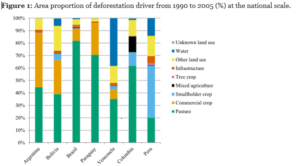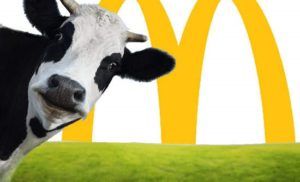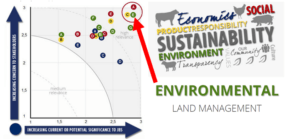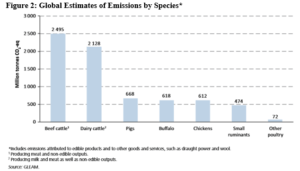A Look Inside the World’s Largest Beef Producer: Is JBS Slaughtering Cows – or the Environment?

My sister – once a ravenous carnivore – stopped eating beef last year. Why? She wanted to fight climate change. Businesses like JBS, the world’s largest beef producer with $45B in sales, must continue to adapt its policies and strategic initiatives in response to the link between beef production and climate change.
Beef Production’s “Steak” in Climate Change
Beef is one of the largest contributors to climate change primarily due to (i) deforestation for cattle pasture and (ii) livestock emissions.
(i) via Deforestation
Land-clearing related to beef production is the largest contributor to deforestation, accounting for nearly 60% of forest loss in studied areas of prevalent tropical forest loss [1]. This impact is amplified in South America, where beef production contributed to 71% of the deforestation seen from 1995 – 2005 (See Figure 1) [2]. Clearing and burning forests subsequently create an estimated 15% of CO2 emissions [3] due to the:
- Loss of CO2-absorbing trees and
- Subsequent massive release of heat-trapping carbon previously stored in trees.

(ii) via Livestock Emission
In addition to requiring significant land use, cattle also go through a fermentation process of plant-based foods in a specialized stomach prior to digestion. This process emits polluting gases including methane, through belching and flatulence. Research estimates that livestock emits 7.1 GTCO 2-eq per annum, representing 14.5% of human-induced greenhouse-gas (GHG) emissions. Beef and cattle milk production represent 4.5 GTCO 2-eq per annum or nearly 65% of the livestock sector’s emissions (See Figure 2) [4].
 Why Should JBS Care?
Why Should JBS Care?
Addressing the link between beef production and global warming must be a fundamental part of JBS’s strategy going forward. They must consider this link when answering key operational questions such as “What suppliers do we partner with? ” or “What systems do we need to invest in to help us meet our sustainability goals?”
JBS will continue to face pressure from its customers – who are attempting to adapt their own policies in the face of climate change – to provide sustainable beef products. For example, McDonalds, a JBS customer, recently committed to only sourcing deforestation-free beef as part of its corporate sustainability program [5]. As of 2013, 40% of McDonald’s green-house gas emissions came from its beef supply chain vs. 30% from its stores [6]. As McDonalds and other corporate clients react to consumer and stakeholder pressure to build sustainability plans, JBS and other suppliers must also be agile in adapting its own policies, processes and products.
At the same time, activist groups and consumers are placing higher scrutiny onto the beef industry. Articles like the Time’s “How A Vegetarian Diet Could Help Save the Planet” [7] are building public awareness to the link between beef and climate change. As an industry, JBS must be able to provide customers comfort or alternative solutions.
The Present: What is JBS Doing Now?
JBS outlined a detail sustainability plan and rated land management as the company’s top current significant item. (see Figure 3)[8]. JBS has pursued several initiatives to address the link between its business and climate change.
Figure 3:

Select Actions Taken:
- Three major slaughterhouses including JBS signed The Cattle Agreement in 2009. Through this agreement, JBS committed to stop sourcing from suppliers involved in deforestation within the Amazon Biome [9]. Subsequently, 85% of JBS’s existing ranchers signed up so they could continue selling to JBS [10].
- JBS co-created the Global Roundtable of Sustainable Beef in 2010, the first global organization dedicated to involving all stakeholders (suppliers, manufacturers, customers) to discuss and advance beef supply chain improvements [11].
- JBS actively participated in the National Cattlemen’s Beef Association research on the beef value chain by providing comprehensive data from its facilities [12].
The Future: “Moo”-ving Forward
Looking ahead, there is still a lot of room for improvement for JBS as a role model and industry leader. JBS has the opportunity to pursue the following initiatives:
- Commit to stop sourcing from suppliers involved in deforestation across the globe, beyond just South America and the Amazon;
- Invest in and work with cattle ranches to educate and promote deforestation-free methods of raising cattle;
- Create and implement clear policies and methods such as map-based monitoring to trace and verify all suppliers directly;
- Consider vertical integration / owning cattle pastures to control and verify more of the supply chain (this strategy is risky and would shift business model)
- Invest in R&D for sustainable meat replacements. Although this may cause decreased demand for its core product, JBS has the opportunity to be at the forefront of innovation in both the “meat” and “meat-alternative” categories;
- Serve as a role model to the beef industry by raising awareness about JBS’s own sustainability efforts;
- Implement “give back” programs; for example, commit to plant a tree for every 100,000 of cattle produced;
- Invest profits back into forest conservation programs.
Word Count: 746 (without citations)
References:
[1] Sabine Henders, U Martin Persson, Thomas Kastner, “Trading forests: land use change and carbon emissions embodied in production and exports of forest-risk commodities.” Environmental Research Letters Vol. 10 (12), via HOLLIS, accessed October 2016.
[2] De Sy, V., M. Herold, F. Achard, R. Beuchle, J.G.P.W. Clevers, E. Lindquist, and L. Verchot, “Land use patterns and related carbon losses following deforestation in South America.” Environmental Research Letters 10(12), via HOLLIS, accessed October 2016.
[3] “Deforestation and Greenhouse Gases.” Congress of the United States, Congress Budget Office, http://permanent.access.gpo.gov/gpo17449/1-6-12-forest.pdf, accessed November 2016.
[4] Gerber, P.J., Steinfeld, H., Henderson, B., Mottet, A., Opio, C., Dijkman, J., Falcucci, A. & Tempio, G, “Tackling climate change through livestock – A global assessment of emissions and mitigation opportunities.” Food and Agriculture Organization of the United Nations (FAO), http://www.fao.org/3/i3437e.pdf, accessed October 2016.
[5] McDonalds Corporation, Beef Sustainability Report, http://corporate.mcdonalds.com/mcd/sustainability/signature_programs/beef-sustainability.html, accessed November 2016.
[6] McDonalds Corporation, Enterprise Carbon Footprint, http://corporate.mcdonalds.com/mcd/sustainability/planet/climate-and-energy/mcdonald-s-enterprise-carbon-footprint.html, accessed November 2016.
[7] Justin Worland, “How a Vegetarian Diet Could Help Save the Planet,” Time Magazine, March 21, 2016, http://time.com/4266874/vegetarian-diet-climate-change, accessed November 2016.
[8] JBS USA, Sustainability Materiality Analysis, http://jbssa.com/sustainability/materiality-analysis/, accessed November 2016.
[9] Holly Gibbs, Jacob Munger, Jessica L’Roe, Paulo Barreto, “Did Ranchers and Slaughterhouses Respond to Zero-Deforestation Agreements in the Brazilian Amazon?” Conservation Letters Vol 9 (1), http://onlinelibrary.wiley.com/doi/10.1111/conl.12175/full, via HOLLIS, accessed November 2016.
[10] Allie Wilkinson, “In Brazil, cattle industry begins to help fight deforestation,” Science Magazine, May 15, 2015, http://www.sciencemag.org/news/2015/05/brazil-cattle-industry-begins-help-fight-deforestation, accessed November 2016.
[11] JBS USA, Value Chain Collaboration, http://jbssa.com/collaboration, accessed November 2016,
[12] Ibid.




Thanks for the informative post Jessie! Your plan for JBS going forward is very well thought out. What I appreciate about many of the points is the lack of heavy capital investment they would take to implement. As you said, vertical integration is expensive and risky, a step that would be difficult to take first. My concern with JBS is with what they decide to do next. If these capital-inexpensive strategies do not have the desired impact, I wonder how far JBS or similar companies would go on their own without regulatory intervention or incentives.
Jessie, found this post particularly informative given that I am a lifelong vegetarian and hadn’t previously put much thought into the beef production industry at large. It’s fascinating that beef cattle emit so much CO2, greater than all the levels of pigs, buffalo, chickens and other poultry combined. That, along with the domino effect applied to its customers like McDonalds’s, makes it obvious that JBS and other large beef producers face a number of hurdles ahead. I just wonder if sustainability practices or alternative solutions to curb cattle emissions as a whole are in conflict with JBS’ underlying business model – as in, if people turn away from beef toward a substitute, that acts directly against JBS’s business interests. For that reason I find your R&D investment solution to be very credible – why not innovate beyond beef production to get ahead of the inevitable beef crisis? Doing so would also position JBS as a thought leader and role model in the space, which you highlighted in your post. Thanks for sharing!
Thanks for the interesting post!
However, if I’m being a bit cynical, it seems like JSB is just “talking the talk”. The Cattle Agreement is impressive, but that was 7 years ago. What have they done since then? You’ve laid out some really great actions for them to pursue, and yet it seems all they have done is organise a set of forums for people to discuss the issue. If they were truly committed to being sustainable, I would have expected them to have achieved more since 2009.
For example, one area you mention that could be pursued further is tracing and monitoring the supply chain. They signed the agreement in 2009 – do you they have a view on the impact it has made? What improvements (if any) the agreement has had on the supply chain?
I think more pressure needs to be put on these companies to hold them accountable for actual improvements, rather than ‘agreements’ and ’roundtables’ which are great for PR but actually achieve very little. We need more people like you and your sister raising awareness, if we really are going to moo-ve forward!
I completely agree that JBS is both slaughtering cows and the environment! I wrote about Tyson Foods with the similar topic on how their livestock production (primarily beef) is contributing to climate change via their deforestation and cow GHG emission rates. I can’t stress enough how meat producers, like JBS and Tyson, need to look at animal-alternative meats to not only reduce their impact on the environment and animal slaughter but also because of the opportunity in the animal-alternative market. It is expected to grow to $5B by 2020 (1) and be at least 1/3 of the total meat market by 2050. It is in everyone’s best interest to reduce their dependency on meat as our technology can advance into bio-engineering food that is not only more sustainable but also better for the health of humans. Not to mention that the benefit of animals from being subject to inhumane treatments and suffering while in the animal farms alone is just as worthy for this recommendation.
(1) http://www.marketsandmarkets.com/PressReleases/meat-substitutes.asp
Thank you Jessie for the great post, very interesting!
As a beef-consumer, I was unaware of the enormous impact that beef production has on climate change. I believe that awareness needs to be built in relation to this topic. However, I am skeptical that JBS would be willing to build this consumer awareness, since there is a clear conflict of interests in demoting beef consumption. This is why I think JBS and the consumers should focus on an efficient use of resources. 10 million tons of food are wasted each year by UK households, according to WRAP [1]. Educating consumers to better use meat can help reduce the production needed to satisfy demand.
In line with reducing waste, JBS could invest in increasing the durability and freshness of its products, so that they don’t perish in such a short period of time.
[1] http://www.wrap.org.uk/food-waste-reduction
The blog points out interesting ways to limit impact of beef production on the environment but they focus heavily on how to limit beef industry’s impact on ‘deforestation’ and not so much on the methane emission. In fact, methane emissions due to beef have been increasing at an alarming rate [1], primarily driven by higher meat consumption in India [2] and China [2] due to rising middle class. But how do we solve for this? Do we just hope that people are going to turn vegetarians overnight or can we produce beef and other meats in a way that leads to less methane emission? Recent scientific advances have proven that lab-produced beef can be an alternative. Health risks associated with lab-produced beef and customer’s willingness to adapt are still open questions but more research in this area can be a potential solution to the methane crisis.
[1] https://thinkprogress.org/methane-emissions-are-spiking-but-it-might-be-more-cow-than-car-791e5233dc2a#.gccwvy9ic
[2] http://www.nydailynews.com/life-style/eats/india-changing-appetites-include-meat-article-1.1255861
[3] https://www.theguardian.com/environment/2008/may/30/food.china1
[4] https://www.washingtonpost.com/national/health-science/lab-grown-meat-is-in-your-future-and-it-may-be-healthier-than-the-real-stuff/2016/05/02/aa893f34-e630-11e5-a6f3-21ccdbc5f74e_story.html
Jessie – thanks a lot for your interesting post! Funnily enough, my sister turned vegetarian for exactly the same reason and I think the discussion on vegetarianism as a key to slowing down climate change is an extremely pertinent one to have.
A recent report by the World Resources Institute suggests that the average American could cut their food’s environmental footprint in half just by reducing their consumption of meat and dairy. Which is why, while JBS’ efforts to make its traditional supply chain more environmentally sustainable are admirable, I have to echo Eric’s opinion above that they need to have a more pivotal shift in their strategy towards meat alternatives.
The crux of the problem lies in world population growth and growing incomes in emerging markets like India and China (where beef consumption is currently low). World population is expected to hit ~10 bn by 2050 of which a third will join the middle class, which tends to consume more calories as income increases. The problems posed by beef are further compounded by how inefficiently it caters to consumption. Studies indicate that only 1% of cattle feed is converted to calories that human consume (v/s ~11% conversion for poultry). I think it is imperative for consumers to start evaluating the ramifications of their consumption patterns and for companies like JBS to be prepared for this shift in consumer consciousness.
1) http://www.climatecentral.org/news/studies-link-red-meat-and-climate-change-20264
2) http://www.wri.org/blog/2016/04/sustainable-diets-what-you-need-know-12-charts
I am embarrassed to say that I always thought people were joking when they said that cows were big producers of greenhouse gases via belching and flatulence. The numbers clearly don’t lie; however, stating the obvious here, there doesn’t appear to be anything that beef producers can do to prevent the release of these gases. I also think that massive, population-wide dietary changes away from beef are highly unlikely. While the deforestation prevention efforts that JBS has engaged in are admirable, it would be great to see them go even a step further – perhaps allocate a % of their annual capital spending to companies that are developing carbon capture technologies. If the company truly wants to be carbon neutral in the future, this appears to be the only way to do so.